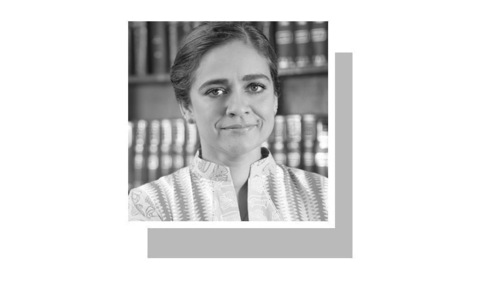ISLAMABAD: The Supreme Court has ruled that male family members deciding the terms of Nikah on behalf of the bride is “accepted as a cultural and social norm”, but it puts her at a disadvantage in the later stages of marriage.
The order, released on Tuesday, was pronounced by a two-member Supreme Court bench, comprising Justices Aminud Din Khan and Athar Minallah, in the case of determining the bride’s entitlement to a plot mentioned in Nikahnama.
In 2022, the Lahore High Court (LHC) decided in favour of a woman, Huma Saeed, who had married Mohammad Yousaf in May 2014.
Mr Yousaf, who divorced his wife in October 2014, challenged the decision in Supreme Court on grounds that the said plot, mentioned in column 17 of the Nikahnama, cannot be interpreted as part of the dower or gift.
In case of any ambiguity in Nikahnama, benefit should go to the wife, Justice Minallah holds
The title of column 17 was ‘special conditions’, “making it distinct from the other columns which have been specifically provided for the purposes of settling the terms of dower”, the petitioner pleaded.
In his written statement before the SC, Mr Yousaf pleaded that the plot was meant for the construction of a house, and his wife was to live in it for as long as their marriage lasted.
“A plain reading of the description of the property, as mentioned in column 17, does not indicate nor support such a stance,” said the 10-page judgement authored by Justice Minallah.
It added that the question before the bench was how to interpret the terms and conditions of a nikahnama in case of any doubt and ambiguity.
“Its [dower’s] determination at the time of the execution of the [nikahnama] must necessarily be guided by an informed understanding of the bride regarding her rights. The freedom to negotiate and settle the terms by the bride, therefore, becomes crucial.”
Bride’s consent
Justice Minalllah regretted that society’s “paternal tendencies” and “dominance of the male members” in deciding the terms and conditions on behalf of the bride has generally been accepted as a cultural and social norm. “It places a bride in a disadvantageous position, inevitably adversely affecting her capacity to execute the contract with free consent”.
The bench held that a Nikahnama “is the deed of marriage contract” entered into by two parties, and its clauses are to be interpreted “in the light of the intention of the parties”.
“The headings, therefore, are not sufficient to determine the intention of the two parties to the [Nikahnama].”
“The courts, while interpreting the contents and terms and conditions of a [Nikahnama], also have to take into consideration the factor of free consent of the bride and her freedom to settle the terms and conditions as a person having an informed understanding of her rights.”
The judgement added that in case of any ambiguity in the terms of Nikahnama, “the benefit ought to go in favour of the wife” if it was established that she wasn’t informed of her rights at the time of the Nikah.
The bench dismissed the husband’s appeal on the grounds of correct interpretation of the Nikahnama by the LHC.
Published in Dawn, April 24th, 2024













































Dear visitor, the comments section is undergoing an overhaul and will return soon.